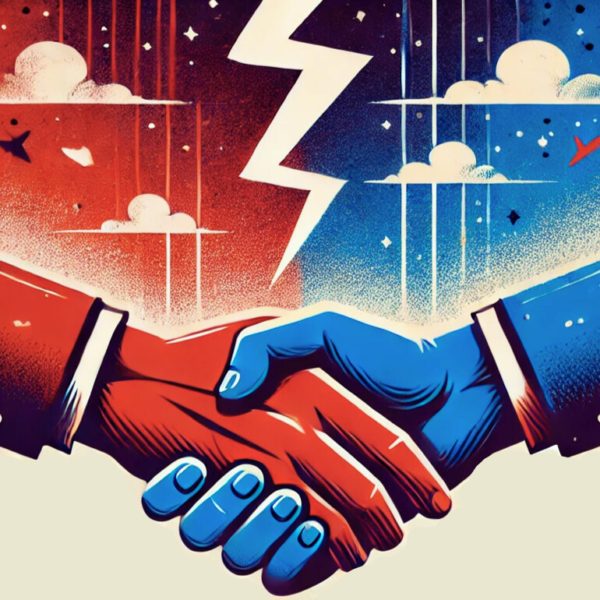By Abby Duke
The 2024 presidential election between U.S. President-Elect Donald Trump and current Vice President Kamala Harris has left more than just political tensions in its wake. As the results pave the way for Trump to return to office in late January 2025, the contentious outcome has fractured friendships, strained family ties and created tense workplaces. Americans now face the challenge of navigating an increasingly deep political divide after Trump’s return to power.
For 22-year-old Haley Dickey, a server at Streamsong Golf Resort in Central Florida, the fallout of the contentious election has made her workplace an uncomfortable battleground. The tension stems not from her job performance, but from her political beliefs, she said.
“I’ve been judged for my decision to vote for President Trump,” Dickey said. “It feels like people see me as a vote and not as a person. It’s made going to work a lot harder.”
Dickey said that she has faced subtle but noticeable pushback from some colleagues.
“It’s exhausting,” she said. “I try to focus on doing my job, but it’s hard when you feel like you’re walking on eggshells.”
Dickey’s experience mirrors a broader national trend. A survey conducted by the American Psychological Association in August revealed that a third of adults report a strain in family relationships due to the current political climate.
Susan MacManus, a professor emeritus of political science and political analyst for ABC Action News, sees a growing connection between misinformation and the erosion of interpersonal trust, she said.
“When deciding on who to vote for, it’s really a matter of your education, income, personal circumstances and your party affiliation,” MacManus said.
MacManus emphasizes that political identity has become more deeply ingrained in personal identity.
“It’s a trend we’ve been seeing for some time,” MacManus said. “People don’t want to communicate with those who differ from them, and that’s creating social and familial rifts.”
Navigating the outcome of this election, MacManus highlighted an outlier— a factor that influenced many voters’ decisions.
“People generally voted most based on the economy,” MacManus said. “When looking through exit polls, it can be seen [that] there were many more working-class voters as well.”
Across the country, these divisions are playing out in households, on social media and in the workplace. Families have become estranged, friends have parted ways and some work environments, like Dickey’s, have been stirred by the election results.
“Co-workers I used to joke with are distant now,” Dickey said. “It’s like everything’s been colored by the election, even if we’re not talking about it outright.”
Similarly, Dickey’s co-worker, 32-year-old Steven Quinones, has faced an opposite polarization at work. Waking up to the outcome of the election, Quinones thought it best to break ties with friends of opposing viewpoints, he said.
“I chose to end my outside relationship with three friends from work,” Quinones said. “It wasn’t about Republican versus Democrat, but the man they voted for.”
Quinones, of Puerto Rican descent, said he was worried for his family members who came to America seeking a stable future, along with the women in his life who could be affected by abortion laws under a new administration.
“Those co-workers were close friends, but I had to do what I thought was best,” Quinones said. “There is just too big of a difference in our values.”
Although this riff in relationships has brought discourse at Streamsong Golf Resort, co-workers Dickey and Quinones have remained respectful amongst the opposition.
“I could never be rude to those I have cut off or let differing mindsets get in the way of our job,” Quinones said.
MacManus said she believes there is hope for healing, but it will require concerted effort from individuals and institutions alike.
“We need to get back to basics: civil discourse, empathy and
understanding,” she said.
Still, MacManus warns that reversing the polarization will not be quick or easy.
“These divides didn’t form overnight, and they won’t be fixed overnight either,” she said. “But we can’t give up, relationships and communities depend on it.”
For her part, Dickey is trying to find ways to navigate her own divided workplace.
“I’ve started focusing on what I have in common with my co-workers,” she said. “We all want the same things—happiness, stability and respect. That’s what I’m trying to remember.”
The road to healing may be uncertain, but for many Americans like Dickey and Quinones, the effort to rebuild relationships in the shadow of political division is worth it.
“At the end of the day, we’re all human, and the world keeps spinning no matter what,” Dickey said.
As the nation reflects on the election aftermath, the question looms: Can Americans find a way to coexist despite their differences? For experts like MacManus, the answer lies in rediscovering shared humanity.
“It starts with listening,” she said. “Only by hearing each other’s stories can we begin to rebuild those relationships.”

